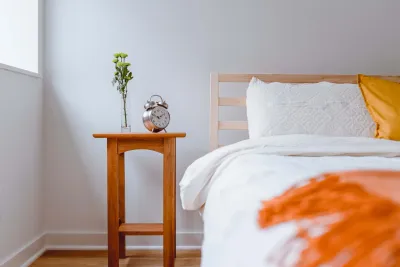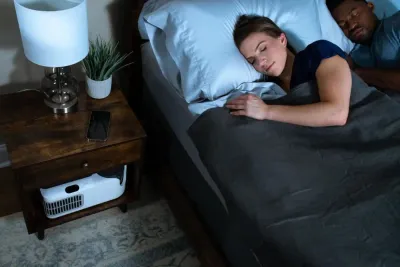
Key Takeaways
A consistent bedtime routine trains your brain and body to wind down, syncs your circadian rhythm, and cuts through nighttime restlessness.
- Going to bed and waking up at the same time each day helps steady your internal clock.
- Calm evening activities like reading, stretching, or quiet music help your body shift out of stress mode.
- Cutting back on screen use at night limits blue light exposure that can delay sleep.
- A cool, dark, and quiet bedroom supports faster sleep onset and fewer wake ups.
- Mindfulness habits such as meditation or journaling can ease racing thoughts before bed.
Sleep isn’t just something you fall into — it’s something you prepare for.
A great bedtime routine helps sync your body’s internal clock, reduce nighttime stress, and make falling (and staying) asleep easier.
Below, we break down what a bedtime routine really is, how it improves sleep, and science-backed steps you can take tonight.
What Is a Bedtime Routine and Why It Matters for Sleep
A bedtime routine is a predictable set of actions you do nightly. It's usually 30–60 minutes before bed. That tells your brain it’s time to wind down.
These rituals can help regulate your circadian rhythm, reduce bedtime stress, and prime your mind and body for restorative sleep.
How a Consistent Sleep Schedule Regulates Your Internal Clock
Yes — consistency matters more than you think. Going to bed and waking up at the same time every day (yes, weekends included) trains your internal clock so your body knows when it’s time to get sleepy and when it’s time to wake up.
Optimize Your Sleep with Chilipad
Ready to take your bedtime routine to the next level? The Chilipad bed cooling system lets you fine-tune your sleep temperature for deeper, more restful sleep—all night long. Say goodbye to overheating and hello to personalized comfort. Your best sleep starts now!
Set a Consistent Sleep Schedule
Yes, a consistent sleep schedule is really important—weekends included. While it’s tempting to treat Saturday and Sunday like free-for-alls, regular sleep and wake time daily helps keep your internal clock running like a well-coded app.
Often overlooked, this simple and effective habit is pivotal in how easily you fall asleep and how energized you feel in the morning. Shoot for 7–9 hours of quality sleep each night to keep your system operating at peak performance.
Why Limiting Screen Time Before Bed Works
It’s all too easy to fall into the black hole of binge-watching or mindlessly scrolling through your phone—just one more episode, one more reel, and suddenly it’s 2 a.m.
Screens look harmless, but that glowing blue light tells your brain it’s daytime — suppressing melatonin, your body’s sleep hormone, and frustrating your bedtime efforts.
It disrupts melatonin production, your body’s natural sleep hormone, making it harder to fall asleep and stay asleep. Limit screen time at least an hour before bed to stay on track. If you need a screen fix, switch on blue light filters or opt for sleep-friendly content like guided meditations.
Trust us, your future well-rested self will thank you by getting more sleep.
Sleep Tip: Turn off screens at least one hour before bed — or use blue light filters — and switch to calming non-digital activities like reading, journaling, or light stretching.
How to Choose Calming Nighttime Activities That Signal Sleep Mode
Sure, you've heard that meditation, stretching, or reading can help you sleep better, but maybe you’re not quite sure how to start. That’s totally fine.
The key is to try a few calming activities and see what fits your vibe.
- Meditation or Controlled Breathing: Meditation or — clears mental clutter and lowers stress.
- Gentle Stretching: Light bedtime yoga or simple stretches. They help relax tense muscles and helps your body wind down.
- Reading a Book (not on a screen): Pick up a physical book or magazine. Helps slow your thoughts and primes your brain for sleep.
- Controlled Breathing Methods: Quiet your mind and signal your body it's time to power down for the night.
You’ll thank yourself later. These low-effort habits work like your own personal sleep protocol, designed to bring calm, clarity, and deeper, more restful sleep.

How to Create a Bedroom for Better Sleep
Your bedroom should feel less like a workspace and more like a sleep sanctuary. A well-designed bedroom environment can make all the difference between tossing and turning and sleeping like a champ.
Here are some helpful tips:
- Keep It Cool: A slightly lower room temperature supports deeper, uninterrupted sleep by helping to regulate your core body temperature. Aim for a temperature between 60-67 degrees Fahrenheit, as this range is known to induce sleep more effectively. Look into blackout curtains.
- Dim the Lights: Your lighting should follow suit as the sun goes down. Lower light levels in the evening help cue your brain that it’s time to wind down and recharge.
- Silence the Noise: Block out barking dogs, street traffic, or your neighbor’s midnight karaoke with white noise or listening to soothing sleepscape sounds.
Upgrade Your Bedtime Routine with Chilipad
As you build a bedtime routine that actually works, don’t overlook the power of temperature control.
The Chilipad is a game-changing bed cooling system that lets you customize your bed’s temperature for the ultimate experience—cool, comfortable, and totally tailored to you.
By helping you maintain the ideal sleep temperature, Chilipad supports your body’s natural rhythms and sleep patterns, making it easier to fall asleep faster and stay asleep longer. No more tossing, turning, or overheating—just deep, uninterrupted rest.
How Mindfulness Helps Power Down Your Nervous System
Upgrade your nightly wind-down with mindfulness techniques designed to ease anxiety and optimize rest.
Here’s how to power down like a pro:
- Journaling: Clear lingering thoughts or stress by offloading them onto paper.
- Breathing Exercises (e.g., 4-7-8): Give your nervous system a soft reset and reduce stress with deep breathing.
- Guided Meditation: Focused audio can gently transition you into rest mode.
How Preparing for Tomorrow Helps You Sleep Tonight
Give yourself a head start by spending 15–30 minutes each evening getting organized for the next day.
Pick out your outfit (yes, even socks), pack up your bag, and take a quick look at your to-do list so there are no surprises in the morning.
Whether it’s pre-making lunch or queuing up your coffee, these small acts reduce worry and remove “unfinished business” from your nighttime loop.
Why Cutting Back on Caffeine and Alcohol Improves Sleep Quality
Caffeine after 2 PM? That’s a no-go if you’re aiming to improve sleep quality. It lingers in your system and can throw off your sleep cycle.
And while a nightcap might knock you out quicker, alcohol is known to disrupt your REM sleep later on for some people.
Establish a Pre-Sleep Ritual
Create a nightly wind-down ritual to signal it’s time to power down. Consider indulging in soothing playlists, enjoying a warm bath, or sipping on herbal tea before bedtime.
By incorporating these activities regularly, you help your body recognize the signals to transition into rest mode seamlessly.
The great news is that the more you stick to your routine, the better your body understands the signals.
Don’t Sleep on Getting Support
If you're still struggling despite trying all the right moves, it might be time to call in backup. There’s zero shame in seeking help. Sleep issues are common, and a healthcare provider can help uncover what’s really going on.
A compassionate, professional approach can make all the difference—and honestly, needing help is never something to be embarrassed about.
Final Thought
Creating a bedtime routine that actually works isn’t about following a rigid checklist. It’s about building a system that works for you! From setting a consistent bedtime schedule to powering down your screens, engaging in calming rituals, handling your tasks and curating your bedroom environment, every step helps program your body and mind for better rest.
Imagine crafting your own nightly routine: consistent, dependable, and designed to enhance your performance. The best part? The more regularly you follow it, the more instinctive—and impactful—it becomes.
So whether you’re journaling your thoughts, dialing in the perfect bed temperature to cool your body with Chilipad, or simply prepping your outfit for tomorrow, you’re investing in a smoother night and a sharper tomorrow. Prioritize it, personalize it, and don’t hesitate to get expert support if you need a little extra help.
Now go ahead, shut it down, recharge, and wake up ready to run the day.
Questions People Ask About Bedtime Routines
How long should a bedtime routine be?
Most bedtime routines work best when they last 30–60 minutes. That window gives your brain enough time to wind down without making the routine feel overwhelming.
Can a bedtime routine fix insomnia?
A bedtime routine can significantly improve sleep habits, but it may not fully resolve chronic insomnia. For ongoing sleep issues, combining a routine with professional guidance or cognitive behavioral strategies is often more effective.
Is it okay to nap if I want a good bedtime routine?
Yes. Short naps are fine. Keep naps under 30 minutes and avoid napping late in the day so they don’t interfere with your ability to fall asleep at night.
What if my partner has a different routine?
That’s ok. Plus, it's common. The key is alignment, not identical habits. Agree on shared wind-down cues like dimming lights or quiet time while keeping individual routines flexible.









